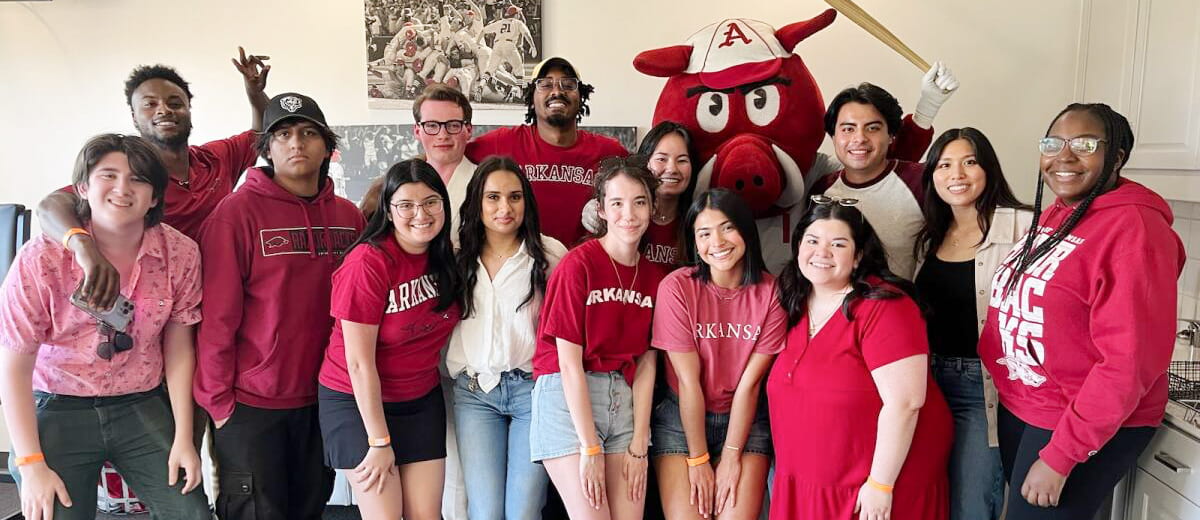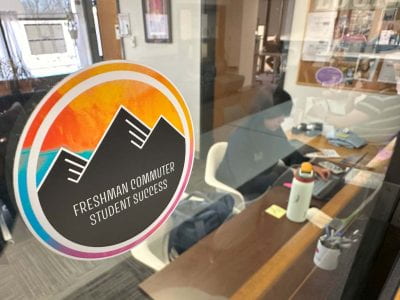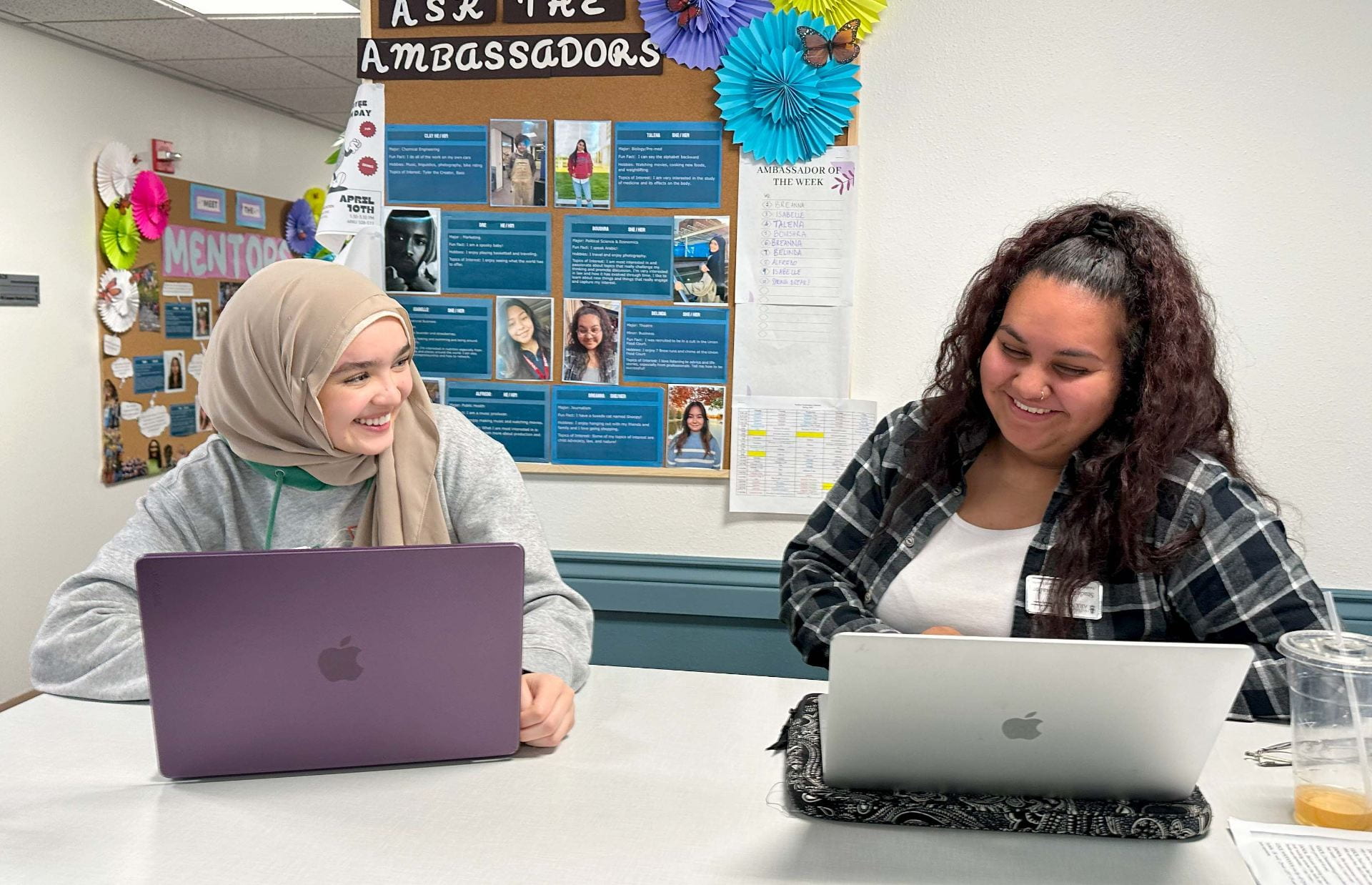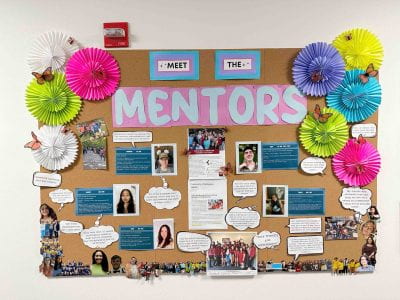
The University of Arkansas achieved a record retention rate for new freshmen from fall 2023 to spring 2024, meaning a record number of students successfully navigated their first semester and continued into their second on their path to Senior Walk.
The overall U of A freshmen class retention rate from fall 2023 to spring 2024 increased nearly 1% from the previous year (from 94.2% to 95%), the biggest increase since 2020. In addition, retention rates among first-generation college students increased by 2.4%.
 One of the programs that contributed to this success is the Freshman Commuter Student Success (FCSS) program in the Division of Student Affairs. Most Freshmen live on campus in University Housing, but there are circumstances where first-year students may live at home in the Northwest Arkansas area. Those students become part of FCSS.
One of the programs that contributed to this success is the Freshman Commuter Student Success (FCSS) program in the Division of Student Affairs. Most Freshmen live on campus in University Housing, but there are circumstances where first-year students may live at home in the Northwest Arkansas area. Those students become part of FCSS.
“We started the school year with 599 students in our Freshman Commuter cohort,” said Francesca DAgrosa, assistant director of Freshman Commuter Student Success. “In the spring semester 544 of those students came back.”
That is a retention rate of 91% and a direct and positive impact on the overall freshmen retention rate mentioned above.
FCSS proactively provides one-on-one academic and social support and assists in specific retention tasks, such as helping students set up advising appointments, helping them use UAConnect to select and enroll in classes, and helping them create time management and study plans.
“We help them make connections and connect to resources,” DAgrosa said. “Our peer mentors play a huge role in our work to help first-year commuter students navigate the semester and not get drawn into the pitfalls that can bring them down.”
Some common pitfalls that traditionally hinder the success of freshman commuters are time management, lack of campus involvement and loneliness, and a limited support network.
Garrison Artman, was a freshman in the program and is now a peer mentor for FCSS. He said there was a time during his first semester that he felt that he wouldn’t make it to the next semester.
“My freshman year was 2020, the year of COVID and I was at home online struggling to adapt to college. I nearly failed calculus, but Francesca reached out to me throughout the semester and encouraged me to finish out before trying to drop courses, and I ended up passing,” Artman said.
“I feel like now that I work for FCSS I try to be open and honest to freshmen about my experience and make sure that they know their options when it comes to dealing with courses, picking good and likeable professors, deciding classes to balance out workload, and encouraging them to do what they feel is good for them,” Artman said. “Afterall, isn’t that what the college experience is?”
Joslyn Sexton is a freshman commuter student who is in the FCSS program and said it was difficult at times the first semester to stay on top of everything.
“I was getting into the swing of balancing a full-time job, marching band and going to classes. Trying to find parking made me just want to go home and skip for that day, but I was determined to make it through and come back in spring,” Sexton said. “They (FCSS) gave me a huge opportunity to learn about everything on campus. Though I’m not new to Arkansas I had never been on campus and had no clue about the many resources that were offered to us, which was a huge help and completely changed how campus life was for me. In addition to this, for me personally, they also helped me get in touch with people of my ethnicity and get involved in the events that are centered around students of color.”

Sexton appreciated her peer mentor. “They gave me the opportunity to meet older students who have been though what I have been through and understand the way to success on campus. They helped me understand different learning styles and which one I may have, and they helped me understand different ways to study to go hand and hand with my learning style to help me be able to retain more of the things that I am learning.”
In addition to the academic advice they also helped by being friendly and helping get Sexton comfortable transitioning from being a high school student to being a college student.
“They frequently check in on me and make sure that I’m still doing okay and help give advice if I’m not,” Sexton said. “They just overall take good care of me. Francesca DAgrosa is amazing in helping me find the resources I need to help me successfully get though my first year of being at the U of A.”
 “We strive to keep students invested in their academic progress through persistent outreach. We provide freshman commuters with timely reminders, useful pointers, and support,” said Emily Williams, a graduate assistant with FCSS. “Our team of student workers and GAs genuinely prioritize the well-being of freshman commuters, going the extra mile to ensure their success.”
“We strive to keep students invested in their academic progress through persistent outreach. We provide freshman commuters with timely reminders, useful pointers, and support,” said Emily Williams, a graduate assistant with FCSS. “Our team of student workers and GAs genuinely prioritize the well-being of freshman commuters, going the extra mile to ensure their success.”
Williams said they empower students to stay motivated and on track to graduate through personalized support and regular check-ins.
“Students really benefit from a mentor-mentee relationship, and this is something we all work hard to foster,” Williams said. “Something I find really special about FCSS is the community. We have groups of students who come up to the lounge every day to hang out and study with other commuters. It’s incredibly rewarding to see how we’ve established a welcoming environment where students feel safe and supported.”
Current peer mentor Destin Wist was a freshman in the FCSS their first year at the U of A. They did not have a lot of scholarships or other financial aid and worried that the cost of going to school would be a burden on their family.
“It was during this period of financial insecurity that I got a call from a peer mentor about my FAFSA that I had yet to complete. I hadn’t completed it the year prior, so I didn’t know the process, leading to me meeting with my now supervisor to get everything filled out,” Wist said. “Because of that meeting, not only did I fill out my FAFSA and receive additional scholarships because of it, I also got offered the job I have now.”
Wist loves the job of peer mentor in the FCSS and helping freshmen like they were helped.
“I offer them the resources they might not realize they have access to as University of Arkansas students. If a student is having a hard time in any of their classes, tutoring is offered as an option. If a student mentions a hard time meeting friends, I might recommend events being hosted by the Multicultural Center,” Wist said. “Students who don’t live on campus are in a uniquely difficult position because they can’t readily take advantage of University offered resources that most other students can use if they just take a 10-minute walk, so it becomes critical to reach these students about their everyday life while they attend, as well as informing them on anything important coming up on campus. FCSS has been a wonderful program to be a part of.”
